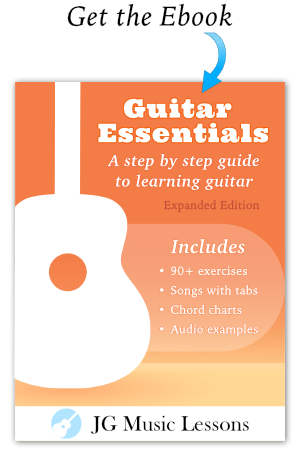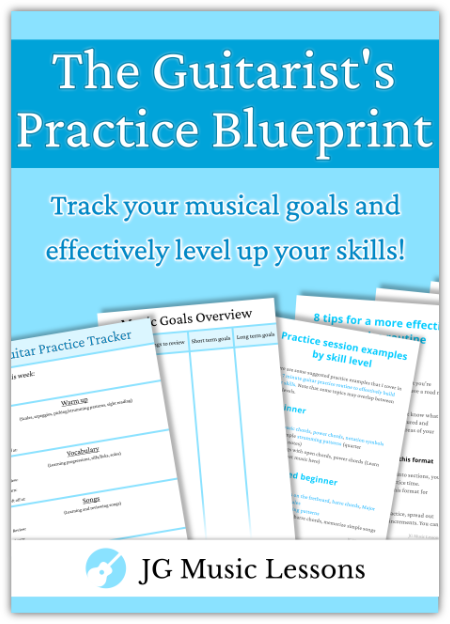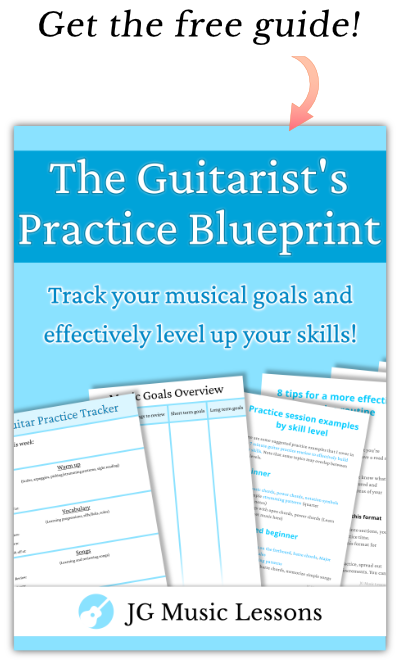Do you ever feel like you should be better at playing guitar than where you’re currently at? Whether you’ve been playing your instrument for a couple of months or several years, it’s normal to experience this frustration in the learning process.
This post covers 6 tips to improve your guitar playing and help you make significant progress regardless of your skill level. Let’s get started!
1. Keep a practice journal
Keeping a practice journal or notes on your phone/computer is a great way to keep track of your progress. Writing down what you’re working on can help you remember to pick up where you left off on your last practice session. You can use a template like this free practice guide to help you with this.
You’re more likely to retain information when you review it as opposed to doing something new and different every time you ‘practice’ but never really master anything.
Write down your goals and different areas you want to work on to get there. For an effective learning/playing session, you can then break up the practice time you have into those different areas which I will also suggest here below.
You can see some practical examples of areas to work on depending on your skill level in this post: 7 minute guitar practice routine to effectively build your skills.
2. Practice high concentration material first
Do you have a habit of picking up the guitar, only to find yourself noodling without any direction or learning something new? Since it’s easy to get comfortable playing something you already know or get sidetracked, I suggest starting your practice session with material that takes more mental energy and concentration like working on scales, arpeggios, picking/strumming patterns, sight reading, or other related material.
Even if this is all you do in your practice session, at least you’ve challenged yourself to do something new and this is how you start to make real progress.
For example, if you don’t know your notes on the guitar fretboard, start your practice session by them on a certain section of the instrument. Or you can challenge yourself to learn chord inversions after learning chords in root position. Another example is instead of practicing a scale up and down consecutively, you could think of playing the scale in sequences of 3 and 4 notes, or in thirds. For more on this, check out this guide on how to practice scales on guitar.
It takes intentional time to work out the material at first but it becomes more natural to you as you review the information and apply it to your guitar playing.
3. Learn and review musical vocabulary
Every genre or style you’re looking to learn has its unique musical vocabulary. You want to try and narrow down the areas that need more focus whether that be learning the progression of a song, learning licks/riffs, or learning a solo. This can also include transcribing, which means writing down a phrase or solo down in musical notation.
The more you do this, the more natural the new musical vocabulary will become a part of your playing. I recommend trying to play the material you’re working on in different keys. You will see great improvement when you focus on specific areas like this.
4. Learn songs
When practicing, it can also be easy to get caught up in just playing exercises that you forget about actually learning songs. After all, this is what music is about.
If you’re not used to doing this, it may seem hard to learn a whole song at first but it’s so rewarding when you can play something from start to finish. At some point or another, someone will ask you to play something and it will be awesome to have some songs that you can play on the spot.
Here is a link to the sheet music with guitar tabs resource on the site to help you learn and practice songs.
5. Have fun and experiment
After intentionally putting in the time to develop your craft, reward and enjoy yourself by playing whatever comes to you. You’ll find yourself coming up with new ideas and making different connections on the instrument because of the time you spent in the previous sections.
For some of you, this open ended section may also inspire you to start creating music or recording yourself. At this point, the goal is to play what you hear and translate that to your instrument or into a recording program. This comes from developing ear training so that the process of creating music becomes easier and smoother.
Related resources:
6. Consistency is key
Finally, as with anything you do consistently, you will see lasting results. Even practicing 10 to 15 minutes a day is better than picking up the guitar once a week for an hour and expecting to be improving quickly.
The idea is that as you review material with frequency, you’re able to retain information and develop muscle memory as opposed to doing the same thing once in a while and losing track of the material you’re working on.
As I mentioned earlier, that practice journal will come in handy so that you stay on track of where you left off. Knowing what you’ve already covered can motivate you to continue improving on current material and know when to move on to the next thing you want to master.
Aside from the fundamentals which we should always review, learn material that is most interesting to you so that you can be more consistent with practice.
Wrapping up
To recap what we covered in this post, the 6 tips to improve your guitar playing are:
- Keep a practice journal
- Practice high concentration material first
- Learn and review musical vocabulary
- Learn songs
- Have fun and experiment
- Consistency is key
I believe that you will see real results in your guitar playing as you begin to apply these 6 tips. Remember to enjoy the process and trying different learning approaches to see what works best for you.
📘 Get the free guitar practice guide here!
All the best,
JG





